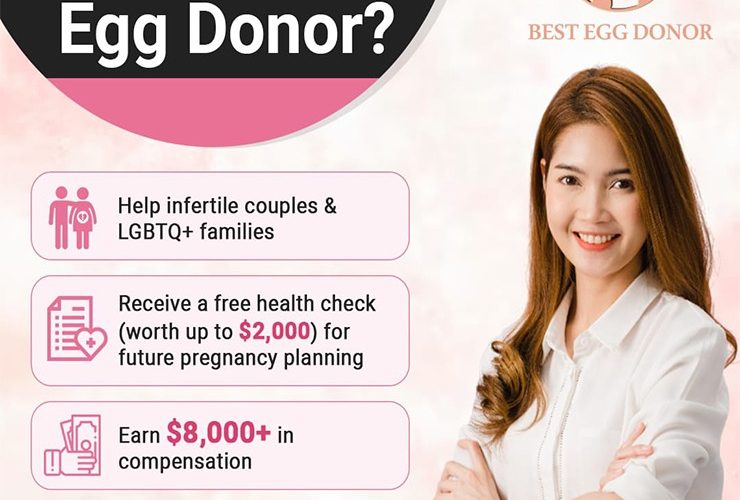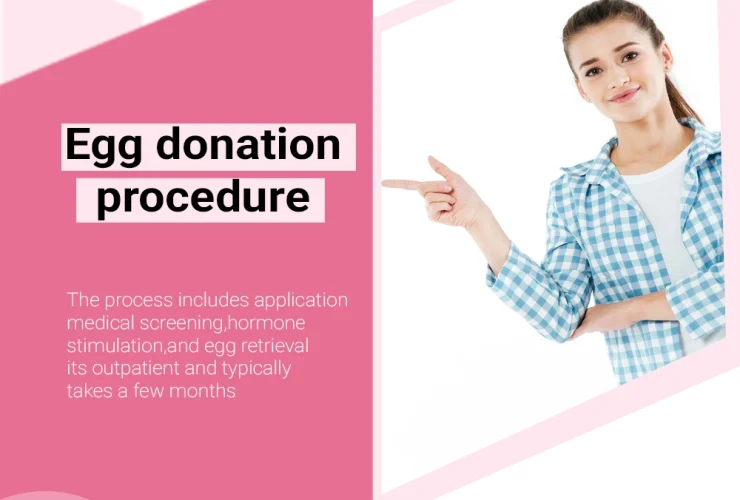Cart 0
DEC
26
26
Eliminate the 5 major risks of egg donation
The risk of donating eggs depends on whether the female donor will react to the medication prescribed by the doctor. Like frozen eggs, “egg donation” requires the doctor to give the appropriate amount of ovulation-stimulating injections based on the donor’s follicle growth status and hormone levels, and to regularly monitor the egg growth rate with ultrasound, so that the quality of the retrieved eggs is good and the chance of fertilization and becoming an embryo in the future is higher.
Some women may experience abdominal swelling, abdominal pain, stomach pain, nausea, and vomiting after donating their eggs, but they usually recover after resting for 1 to 2 days. A very small number of women will experience ovarian stimulation syndrome after donating their eggs.

What is Ovarian Hyperstimulation Syndrome (OHSS)?
Certain hormones may stimulate the ovaries, eventually leading to increased capillary permeability, causing macromolecular components (e.g., proteins, electrolytes, etc.) in the blood vessels to leak out of the blood vessels and flow to the thoracic and abdominal cavities and lymphatic circulation, resulting in symptoms such as decreased blood volume, ascites, pleural effusion, and edema of the limbs. Ovarian hyperstimulation syndrome is a gynecological emergency and is divided into three categories: mild, moderate, and severe. According to statistics from the Department of Obstetrics and Gynecology at the National Taiwan University Hospital, the incidence of severe OHSS dropped to less than 1% in 2008.
For more details on ovarian hyperstimulation syndrome, please visit the website of the Department of Obstetrics and Gynecology, National Taiwan University Hospital
Debunking myths about side effects of egg donation 1: “Will egg donation harm the body? Is it bad for the body?”
Egg donation: Women produce eggs every month. Before they are discharged from the body, doctors can directly remove the eggs. It does not cause pregnancy or abortion, and it will not harm the body. There will be no physical sequelae after egg donation. However, it is necessary to supplement with protein and coconut water after egg donation to reduce the accumulation and metabolism of ascites after surgical anesthesia.

Donating eggs is the same as using frozen eggs for in vitro fertilization, except that ovulation injections are used to make the existing eggs grow better and bigger, making them suitable for future fertilization and embryo creation.
The location of the ovulation-stimulating injection for egg donation is near the navel, where the fat is the most, so the drug will be absorbed by the fat immediately; the appropriate dosage of the drug is given under the evaluation of the doctor. When the drug is injected, some girls will gain weight, have more hormones and are prone to acne, but the symptoms will stop after the drug is stopped and the egg retrieval is completed.
Debunking the myth about side effects of egg donation 2: “Will my menstrual period be disrupted after egg donation?”
The relationship between eggs and menstrual periods: Every month, 5 to 12 primordial follicles develop into primary follicles in a woman’s ovaries; however, usually only 1 primary follicle develops into a mature follicle and releases an egg, but occasionally 2 eggs may be released; if the egg does not meet the sperm during ovulation, it will be shed along with the endometrium and discharged from the body, which is “menstruation.”
Egg donation will not affect the menstrual period, because girls ovulate every month, just like hair and nails, the body will continue to produce more eggs, and it will not affect the menstrual period. In addition, during the egg donation period, women will need to take birth control pills to stabilize the menstrual cycle, but the menstrual period will be more stable.

Debunking myth 3 about side effects of egg donation: “Is it true that egg donation can cause infertility?”
Many women’s myths:
“Egg donation means donating my only egg to someone else, so egg donation will cause infertility, right?”
“No, of course not!”

A woman will release 400-500 eggs in her lifetime, 1-2 eggs per month, and the body will metabolize the rest of the follicles. Through medication, the follicles that were originally to be metabolized will be retained to release the eggs. Only 10-50 eggs will be taken out in one egg donation . After the egg retrieval, it will not affect the next ovarian egg production, so egg donation will not cause infertility. And after the egg donation, you can rest for 1-2 menstrual cycles, and after the ovaries have rested enough, you can donate eggs again. There are also many women who can undergo egg donation surgery or frozen eggs even if their fallopian tubes are blocked as long as they can produce eggs.
Debunking the myth about side effects of egg donation 4: “Will my eggs become fewer?”
When a female baby is born, there are about 1 to 2 million primordial follicles (also called filtration follicles). When a female reaches the age of 10 to 16 and welcomes her first menstruation, there are about 300,000 to 400,000 follicles left. Only 10 to 50 eggs are retrieved in one egg donation, and the ovaries release eggs every month. One egg donation will not affect the number of eggs released by the ovaries in the future.

Debunking the myth about side effects of egg donation 5: “Will my physique change and weight gain if I take ovulation injections after donating eggs?”
The ovulation injection for egg donation is just like the normal frozen egg test tube, and there will be stimulation of ovulation-stimulating drugs. At present, clinical experiments have indeed shown that some women who have been injected with ovulation-stimulating drugs have affected hormone secretion, causing the body to gain weight and acne, but these can be adjusted under the doctor’s drug dosage adjustment. Because each girl reacts differently to drug stimulation, some women will have a reaction of gaining weight and vigorous hormone metabolism, but these will be relieved and improved after the egg retrieval.
For more information, please refer to the National Health Administration website “Before donating sperm and eggs to help others, be aware of the risks, stop and listen”

The following risks of donating eggs in the United States should be noted in advance!
Most women who go to the United States to donate eggs are attracted by the high nutritional fees. The nutritional fees for legal and safe egg donation in the United States range from $8,000 to $20,000, depending on conditions and experience. When choosing a hospital, you need to pay attention to the following matters:
Must confirm:
- Are there any additional agency fees?
- Can I stay in the United States for the full 14 days?
- Is there any medical insurance provided for the approximately 14 days between egg donation and egg retrieval?
- Have you ever had anesthesia discomfort?
- Is there anyone in your family who is infertile or has had ovarian cysts?
remind!
- Do not smoke, drink, or smoke marijuana or other prohibited substances
- If you are taking medication regularly, you need to consult your doctor whether it will affect egg donation.

Given the risks, why are there still girls willing to donate eggs in the United States ?
Going to the United States to donate eggs is relatively risky and full of uncertainty, so the United States will give egg donors relative compensation (nutrition money), compensation for cooperation in the early stage of the examination, discomfort of ovulation injections, and gratitude after egg retrieval. For the prospective parents who receive the donated eggs, these are opportunities to have a dream of having a child, because they can then have a healthy baby through IVF or surrogacy. The United States is the most advanced country in the world in “assisted reproductive technology”, and doctors are more experienced in egg retrieval technology than Taiwan. You can also travel in the United States, which is why many girls choose to go to the United States to donate eggs. Travel tickets and accommodation are free, and you can donate eggs to prospective parents and receive nutrition money.


Recommended egg donation in the United States: EggLove
Egg Love is a legal egg donation company in the United States with transparent information. It cooperates with Baby Seeding, the largest egg donation matching company in Taiwan, and many well-known reproductive assistance agencies in Southern California, and provides safe and reliable accommodation and guidance for medical examinations. Many girls turn to Egg Love for matching after cooperating with other agencies. In addition to Egg Love’s reliable reproductive medical institutions in the United States, Thailand, and China, it will also provide assistance to egg donors as soon as possible, whether it is food, drink, entertainment, or accommodation, it will provide the most reassuring assistance.
Many egg donors are rejected at the first stage because of their photos. Egg Love can also help provide free photo shooting for egg donation photos✨ . 🙌🏼

Why Egg Love?
- Cooperating with reproductive assistance agencies in different countries to donate eggs
- One-stop fertility service: providing American egg donation, IVF, and surrogacy services
- The most competitive nutrition fund for egg donation in the United States
- English-Chinese translation
- Egg bank matching is the fastest within a week, no need to wait
- Free accommodation
- Medical examination expense reimbursement
- Air ticket expense write-off
- Experienced 24-hour online service
- Dedicated WeChat and LINE teams to follow up on progress
- Specialized service for medical examination questions
Taiwanese girls who are interested in consulting egg donation are welcome to join the Egg Love Line official account. Someone will be dedicated to answer all your questions.






